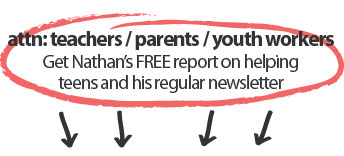 The silver bullet for student engagement
The silver bullet for student engagement
This year more than ever I have been asked by schools, conferences and organisations to run training workshops for teachers, youth workers and adults who work with teens on motivation and engagement.
I figure motivation and engagement are pretty hot topics, so I want to provide my subscribers with some practical keys to engaging teens.
Can I ask you this question…
How engaged are the teens you work with?
A study that found of 1,500 classrooms visited, 85 percent of them had engaged less than 50 percent of the students. In other words, only 15 percent of the classrooms had more than half of the class at least paying attention to the lesson.
Another question…
Who’s responsibility is it for their level of engagement? (Just something to ponder)
Another thought…
If the teens you work with didn’t have to attend, would they?
So let’s get into these Rules of Engagement
The silver bullet = RELATIONSHIP
I heard it said recently “I am their teacher, I’m not paid for them to like me”
Let me tell you right now, teens will not learn from someone they do not like!
It may not be your ‘job’ for teenagers to like you, but if you want to enjoy your job and to do well at your job, it is not just a nice idea, it is imperative that you understand that building a genuine relationship with the young people you work with is the first key to any sort of engagement.
Having rapport and relationship with teens translates to powerful and influential leverage. The kind of leverage that compels them to want to please you, to want to work with you, and to want to do well.
When I think back on my teenage years the teachers and adults I remember and the teachers I wanted to please were the ones I had some sort of relationship with – more than just being my teacher and being told what to do, but something genuine and real. They allowed themselves to be somewhat vulnerable and opened themselves up to me to be seen as real person, with a story and life experiences and passions and funny little idiosyncrasies.
The better relationship you have with the teens you work with – the easier classroom management and behaviour management becomes.
The aim of having more connected relationships with your students and young people isn’t to create familiarity but to create trust and responsiveness.
Within the framework I teach (Transformative Youth Work) – we understand that behaviour is just the ‘tip of the iceberg’! Underneath the surface are the 7 levels which drive behaviour.
- Skills and Strengths
- Emotions
- Beliefs and Thinking
- Core Needs
- Identity and Personality
- Purpose and Mission
- Environment
When we as adults create trust and responsiveness with the teens we work with – through developing genuine relationship we will find that they will open themselves up a lot more to allow us to scratch the surface and dig deeper to help them become the person they have the potential to be.
3 Quick Tips To Build Relationship With Teens
1. First Impressions – First Five Minutes
The way an interaction begins often has the power to set the tone for the rest of the appointment or class. How you welcome students into the room, the tone of the room, the atmosphere plays a huge part in setting the tone.
For teachers – do you welcome your students into the classroom at the door, shaking their hand, smiling and making eye contact, or do the students just make their way in, without much recognition at all?
Whether you’re a teacher, a youth worker or an adult who works with teens – first impressions set the tone for the rest of the engagement so:
- Be engaging right from the start.
- Pay individual positive attention to each student as they arrive.
- Smile and look them in the eyes.
- Be genuinely interested in them, how they are feeling, what’s been happening
- Be positive and upbeat
- Make it all about them
- Acknowledge their strengths
Take the responsibility for setting the tone.
2. Give – Time, Positive Affirmation, Yourself, Empathy, Understanding
One of the laws of the psychology of influence according to Dr Robert Cialdini is the law of reciprocity.
It outlines that in human nature we feel obliged to reciprocate when we are given something.
I am not saying that you should give gifts, or money or anything of significant value to your students.
What I am saying is that by being someone who gives of themselves, gives affirming compliments, is generous with their words, their time and their positive actions it will not only create great connection with the teens you work with, but you will also start to see these things coming back to you.
3. Listen Without Judgement
We can learn a whole lot about teens, their story, their background, what’s going on in their world, when we just take the time to stop and listen.
But more than that it is important as trusted adults in the world of these teens that we create a safe space where they know that they are being heard and also not being judged.
Its often easy for us to launch straight into solution mode (especially us males), but often teens need an adult who will listen to what they have to say without judging and sometimes without even providing them with any feedback or response. (Unless they ask for it)
There is so much more I could say about building real, genuine relationships with teens but this email has already turned into a bit of a novel.
Check out the remaining articles relating to “How to motivate and engage teenagers”:
- The silver bullet for student engagement
- The power of empathy in student engagement
- Emotional Intelligence in student engagement
- How to use rewards to motivate students
- How to increase student engagement
- How to effectively communicate with teens
I am regularly running professional development workshops for teachers, youth workers and professionals around based on the principals of developmental psychology, positive psychology and neuroscience to help adults understand teenagers and how best to engage, inspire and empower them to know themselves, be their best and make a positive difference in the world.
I’d love to talk to you about how I might be able to support your organisation and empower you to connect with, engage and motivate the young people you work with – for booking enquiries click here!

